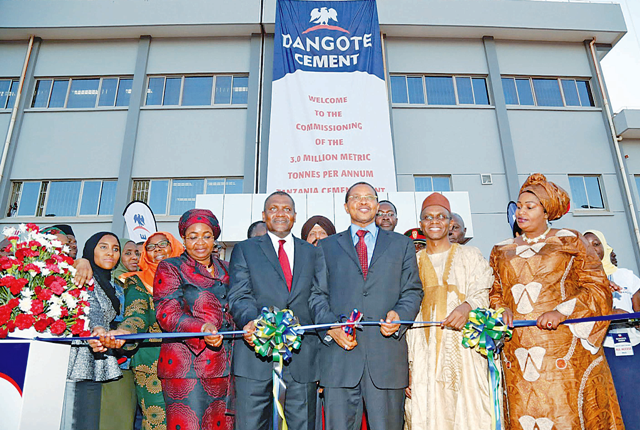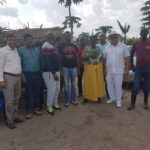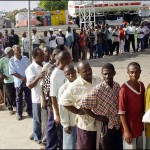PRESIDENT Jakaya Kikwete and his Nigerian counterpart, Muhammadu
Buhari have described business mogul, Aliko Dangote, as Africa’s
economic stimulant whose investments have improved economic stability
and standard of living in Africa.
The two leaders were speaking on the occasion of the commissioning of
Dangote Cement’s multi-million dollar new cement plant in Mtwara on
Saturday and ground-breaking of the 26 hectare -jetty which attracted
top shots from Nigeria, Tanzania and the neighbouring countries of
Rwanda, Burundi, the Democratic Republic of Congo and Mozambique.
President Kikwete said there was no better way of rejuvenating and
sustaining nation’s economy if not through investment which create
jobs and trade opportunities.
He described the 3m mtpa cement plant as the largest cement plant in
the Eastern and Central Africa, noting that the investment is a huge
one that would have a huge impact on bilateral relation between
Tanzania and Nigeria. “It will go a long way in transforming our
happily existing diplomatic and political relations into investment
and trade arena”, he noted.
Dr Kikwete pointed that the timing of the commissioning of the cement
plant was auspicious, coming at a time when the demand for cement is
on the upsurge and increasing both locally and regionally.
“It is logical that there is a sound relationship between economic
growth and booming of the construction sector whereby cement is a
critical input. Tanzania is one of the countries where such
relationship can easily be traced.”
To drive home his point that Tanzania is a good destination for
investment, Kikwete said Tanzania has registered an average growth of
7 per cent which makes her one of the top 10 fastest growing economies
in Africa and that as part of this growth, the construction sector has
grown 7 per cent of the GDP in 2005/2006 to 12.5 per cent of the GDP
in 2014/2015.
He disclosed that cement prices have been increasing as one moves
further away from the cities because of the shortages in supply as
opposed to increasing demands and that Dangote Cement is coming to
fill the gap.
On his own part, President Mohammadu Buhari, who was represented by
the Kaduna State governor, Mallam Nasir El-Rufai, said Dangote is a
key role player in the economic development of Africa and this his
investment model is in tandem with the unfolding economic policy of
his government.
He said Dangote, Africa’s richest man, is teaching Africa nations on
the need to adopt an economic integration policy which will encourage
Africans to invest in their continent rather than waiting endlessly
for the elusive foreigners to come and help invest and develop Africa.
Buhari thanked the government and people of Tanzania for providing the
enabling environment that makes business to thrive even to
non-indigenes.
The Minister for Transport, Samuel Sitta, who represented the Prime
Minister, said investment remained a critical input in developing
economy, saying it was for this reason that the government has been
working closely with Tanzanian Investment Centre (TIC).
Presently, Sitta explained, the government was implementing some
reforms that ensure investments run smoothly adding that, the reforms
especially in tax, public sector, financial sector, innovations in
rural finance, telecommunications and infrastructure as well as
revamped legislative frameworks, have produced an enabling environment
that has further provided a platform for future growth.
“We hope to see more foreign investors take advantage of these
opportunities and invest in other sectors that will have multiplier
effects on the Tanzanian economy,” he said.
He described the commissioning and the ground breaking as significant
milestone in the task of economic development of Tanzania. Speaking
earlier, the president of Dangote Group, Aliko Dangote said the key
factor that drives investments in an economy is the presence of an
investor-friendly business climate and noted that indeed, Tanzania is
one of the most attractive investment destinations in Africa. This he
stated was attested to by the substantial amount of foreign direct
investments (FDI) that flows into the country, annually.
The latest commissioned cement plant is part of the ongoing African
expansion drive of the Pan-African conglomerate. Earlier the company
has opened its plants in Cameroon, Zambia and Ethiopia. The
commissioning of the Senegal and South Africa plants would follow suit
according to the company’s president.
Dangote expands ‘cement empire’ to Tanzania







